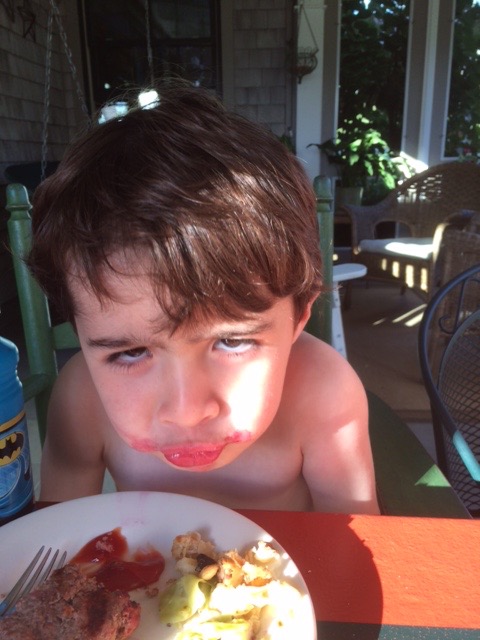 “If only I didn’t get so angry!” Parents know their anger causes all sorts of problems—but what do you do about it?
“If only I didn’t get so angry!” Parents know their anger causes all sorts of problems—but what do you do about it?
Fear is what provokes anger. And fear is where parents live a great deal of the time.
He’s so mean to his sister, how’s he going to treat his wife?
She never listens. How will she ever get through school?
He is so violent. He’ll be in jail by fifteen.
She’s so bossy. No one will ever like her.
He’s addicted to screens. How will he ever interact with anyone.
Other kids listen to their parents. Why won’t mine? What have I done wrong?
Handling the problem that faces you in the moment requires staying in that moment with your child. Let’s say your four year old is having a meltdown to end all meltdowns. You have told him to stop hitting his little brother. He falls apart, screams and stomps, tells you to go away, screams “no” at every attempt you make to calm him down. It’s easy to let fear take over. What kind of a monster is he turning into? He can’t just hit his brother. He has to have a consequence? He’s never going to learn. What have I done to create this?
And fear leads to anger. It’s logical. If these fears sabotage rationale thinking, you will get angry at your child in an attempt to correct his behavior thereby alleviating your fear. (It really is all about us). Your job, after all, is to correct your child’s unsocial behavior and teach him to be kind. So you yell, scream, and threaten to take favorite things or activities. That will surely make him think twice and stop this horrible behavior.
The problem is this thinking ignores your child’s emotional triggers. Your four year old knows very well that he is not supposed to hit his brother. How many times have you told him? In the moment of stress, his impulses get the better of him. His brother had something he wanted, or just had something. He tried to take it away because he didn’t want him to have it. Unacceptable, yes. But developmentally appropriate to the emotional workings of a resentful four year old. Impulses hijack rationale thought—for us too. So even though he knows it’s not acceptable to hit, he hits. He knows he has done something wrong even before you yell. Then you get angry, and he melts down because now he sees himself as unloved and unacceptable. Does this teach him what you want him to learn?
The answer is to stay calm—and confident in your child’s ability to come back to rationale thought when his emotions cool, which happens sooner when you are calm.
Every success story I receive includes, I was able to stay calm. So how do you do that? The cognitive process shows us that our thoughts about whatever is happening are what trigger our emotions and then our reactions. So when our thoughts, fears, assumptions, and perceptions fly sky high and we jump to all kinds of conclusions, the only logical outcome is heightened, negative emotions and reactions based on those emotions.
So the key is in getting ahead of our thoughts and the resulting emotions.
Another trigger parents face is the idea that a lesson must be taught right away or the child will never learn. Our four year old cannot hear anything that is said to him in the moment of emotional overload. All he knows is that he is wrong and is at risk for losing your love. When you angrily admonish him, you are confirming (momentarily) his worst fears and he screams to make you go away to protect himself—even when you are trying to be rationale with something like, I know you are angry, but you have to learn you can’t hit your brother.
Your child needs time to get through his strong emotions and come back down to earth, and you need time to pay attention to your thoughts and fears and allow your reasoning cortex to come back online. When you stay in quiet presence for your child and give yourself time to think, you are better able to tell yourself, He is emotionally wound up and needs time. This does not mean he will be acting like this all his life. He needs to know he is okay. I can do that for him.
Your best rule of thumb in the moment is to:
Stop – Do not go on automatic. This is not the time to teach anything.
Breathe — Do not underestimate the power of your breath to get you back in your body.
Wait – Give both you and your child time to cool down.
Think – Go over your fears and do what you can to talk yourself down.
Go back to it – Do not sweep it under the carpet. This is the step avoided so as not to dig up the emotions again. But this is the time when children are ready to make amends and listen as long as they do not feel blamed. After emotional release, the child wants and needs connection and is rational once again. He is ready for, You were so mad at your brother that you couldn’t stop yourself from hitting. I know you know that’s not okay. Let’s talk about what might help you the next time you get angry.
When you can trust your child will respond, you are better able to stay present in the moment of his emotional meltdown. Then all you have to do is wait.








thanks Bonnie. You’ve told me this before, but it is so good to re-read it.
“Stop, Breathe, Wait, Think, Go back to it”. My new mantra along with “he’s not being a problem, his is having a problem”!